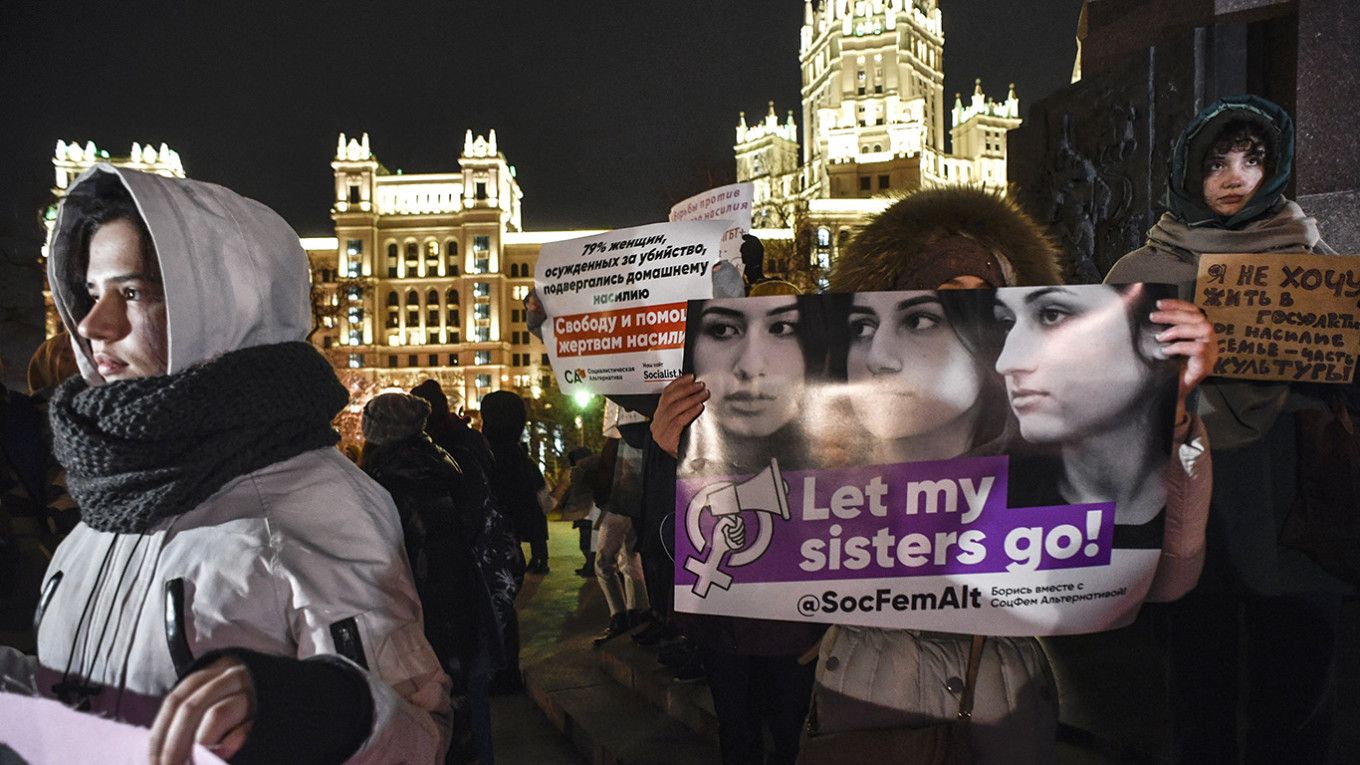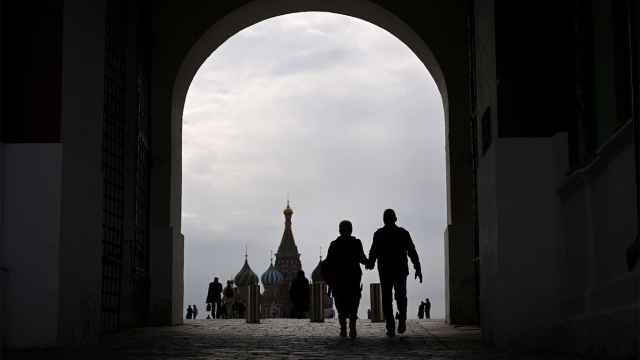The late Mikhail Khachaturyan was finally found guilty on April 21 of years-long physical and sexual abuse against his daughters. This is a landmark verdict in a country where domestic violence is widespread and often ignored or condoned by the authorities.
Khachaturyan became infamous after he was killed by his daughters — 19-year-old Krestina, 18-year-old Angelina and 17-year-old Maria — in July 2018. The girls’ lawyers claimed that they acted in “necessary self-defense” after their father repeatedly threatened to murder them and their mother, nearly killing Krestina by firing pepper spray into her face.
However, some of Mikhail’s relatives wanted the sisters sentenced for murder “committed by a group of persons by prior conspiracy” if their claims against their father could not be proven. If convicted, the sisters would have faced up to 20 years in prison.
Now that Khachaturyan’s abuse has been proven, these girls finally have a chance to start a normal life.
But this court decision is more than just a turning point for three young women.
As Russian lawyer and human rights activist Anna Rivina said, the Khachaturyan sisters’ case holds symbolic meaning for Russia. The decision was only possible thanks to public outcry and widespread interest.
Indeed, the case became one of the loudest and most widely discussed in recent decades, featured everywhere from federal news channels to true crime podcasts. It sparked discussions in the Russian parliament about the criminalization of domestic violence, inspired hundreds of Russian women to take to the streets despite the usual societal inertia and encouraged many to volunteer at crisis centers.
This case brought national attention to issues like domestic abuse, self-defense rights, corruption and the intersection of sexism and xenophobia — issues that affect not only these three girls, but the entire country.
It seems symbolic that just days before the court’s decision, Russian media reported on a 15-year-old schoolgirl who killed her father as he attacked her older sister with a knife. Tragically, domestic violence remains a massive problem in Russia and Russian-occupied territories. Nearly 80% of women in Russia convicted of murder are actually convicted of “extending self-defense.”
At the same time, there is no law criminalizing domestic violence. The worst many abusers face is a small fine before returning home to continue abusing their victims.
According to the Consortium of Women’s Non-Governmental Organizations, from 2011 to 2019, 65.8% of all women murdered in Russia were victims of domestic violence. That figure rose to 71.7% in 2021. More recent figures are unavailable because, since the Russian-Ukrainian war began, independent women’s rights groups fighting domestic violence have come under pressure and even been labeled “foreign agents.”
Russian gender and family norms are deeply rooted in ponyatiya, unwritten rules derived from Soviet prison culture. According to ponyatiya, the man is the unquestioned head of the household, free to do anything from abandoning his family to abusing his wife and children. Women are permitted to beat children. Family life becomes entrenched in violence and fear. The same holds true for many post-Soviet countries.
As someone who was physically abused by their father for years, I can say from experience you cannot rely on neighbors or the police. In my case, the beatings only stopped when I began to fight back and was old enough to live independently.
The case made my heart freeze because I know that, under slightly different circumstances, I could have been in their place. My father sexually harassed me and my 12-year-old school friend. Just like Mikhail Khachaturyan, he was a well-respected, religious man. Just like the Khachaturyan family, mine appeared normal to outsiders.
When I tried to speak out, I was shamed and silenced. After all, my father was an engineer and regularly attended the Russian Orthodox Church. I was just a weird child.
I was later diagnosed with acute PTSD and dissociative identity disorder due to the abuse I suffered.
Thankfully, my father did not abuse heavy medication or have connections to the criminal world or own weapons like Mikhail Khachaturyan. My childhood was not as hellish as the Khachaturyan sisters’. But when the girls were arrested in 2018, I followed the case with a mixture of dread and hope.
There was dread because of the lengthy prison sentence the girls could have been condemned to for saving their own lives after enduring years of horrific abuse. I was also dreading the racist reaction to the news: Armenians in Russia often face everyday racism, being stereotyped as more sexist or hot-tempered. Some Russians blamed the Khachaturyan family’s Armenian origin for the abuse. Racism mixed with misogyny.
But then, Armenian human rights activists and celebrities launched a solidarity campaign to support the sisters. Armenian-American rock musician Serj Tankian and author Narine Abgaryan spoke out in their defense.
I saw women from Ukraine, Russia and Belarus rally online in support. The movement became global. In Russia, the sisters received backing from celebrities like rapper Basta, talk show host and politician Ksenia Sobchak and singer Anna Sedokova. Feminist and women's organizations held workshops and events on how to oppose domestic violence.
Russian influencers Alyona Popova, Sasha Mitroshina and a dozen other bloggers with millions of followers launched the “I Didn’t Want to Die” flash mob in support of the sisters and other domestic violence victims.
In St. Petersburg and Moscow, hundreds joined a demonstration called the “Sister March” despite the government refusing to allow it. The name held a double meaning: it showed solidarity with all women suffering from male violence, while also demanding justice for the Khachaturyan sisters.
One of the most common signs on protest read: “I am/We are the Khachaturyan sisters.”
As a survivor of domestic violence, it moved me deeply.
This kind of social movement, inspired by a single case, is rare in Russia. As someone who’s been part of St. Petersburg’s feminist scene, I can say that local cases rarely gain such attention, especially compared to Western news stories such as Black Lives Matter and Donald Trump that everyone likes to discuss more than local issues for some reason.
But the Khachaturyan case resonated beyond activist circles. According to the Levada Center, in 2019, 33% of men and 47% of women supported the sisters’ actions in self-defense.
Part of the reason was celebrity support, through the influence of Basta and Sobchak. But the other reason is that domestic violence is so widespread — everyone in Russia knows someone who has suffered under a household dictator.
The case was not just about domestic violence, but also about broader topics such as corruption in Russian security forces. Mikhail Khachaturyan had deep ties to the local police and prosecutors, meaning his wife and daughters could never get legal protection. So this case also sparked national discussions about corruption in the security forces.
The sisters’ mother, Aurelia Dunduk, said in an interview that her daughters were stunned by the public support. They speak to her through tears, overwhelmed by the compassion of strangers. Their father taught them that no one would care about them, no one would believe them. That is a feeling many domestic violence victims know all too well.
That is why this case — and the court’s latest decision about Mikhail Khachaturyan’s guilt — is not just about the Khachaturyan sisters. The verdict gives some hope to millions of women in Russia and Russian-occupied territories that the mentality can be changed.
A Message from The Moscow Times:
Dear readers,
We are facing unprecedented challenges. Russia's Prosecutor General's Office has designated The Moscow Times as an "undesirable" organization, criminalizing our work and putting our staff at risk of prosecution. This follows our earlier unjust labeling as a "foreign agent."
These actions are direct attempts to silence independent journalism in Russia. The authorities claim our work "discredits the decisions of the Russian leadership." We see things differently: we strive to provide accurate, unbiased reporting on Russia.
We, the journalists of The Moscow Times, refuse to be silenced. But to continue our work, we need your help.
Your support, no matter how small, makes a world of difference. If you can, please support us monthly starting from just $2. It's quick to set up, and every contribution makes a significant impact.
By supporting The Moscow Times, you're defending open, independent journalism in the face of repression. Thank you for standing with us.
Remind me later.






